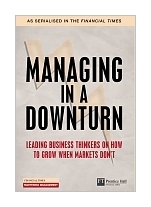|
||
• wydawnictwa polskie
• Zamów informacje o nowościach z wybranego tematu • kontakt
• Cookies na stronie |
MANAGING IN A DOWNTURN LEADING BUSINESS THINKERS ON HOW TO GROW WHENMARKETS DON'Twydawnictwo: PEARSON , rok wydania 2009, wydanie Icena netto: LEADING PERSPECTIVES ON THE RECESSION Managing in a Downturn brings together the world’s leading business thinkers on the big questions confronting managers and executives in today’s painfully credit-crunched times.
This premium collection of cutting edge business thinking will help you get a clear perspective on the downturn, how it could affect your business and how to manage through it. Hear what the experts have to say. With the recession now clutching us in a firm grip, it can be difficult to think beyond the doom and gloom. For senior managers and executives, navigating through turbulent times is never easy. From Bear Stearns and Lehman Brothers to General Motors and Woolworths, the fall-out from the first severe downturn of the 21stcentury has yet to play itself out.In such uncertain times, the instinctive reaction can be to cut costs and hunker down until things get better. But retreating into a protective shell is not always the right decision for the long term health of your business. Indeed, a downturn can present a great opportunity for companies to reposition themselves, scour the market for good deals, recruit talent from competitors and, ultimately, equip themselves for sustainable long-term success. Managing in a Downturn brings together a range of leading business experts to offer their observations and new business thinking on surviving – and even better, thriving – in an economic downturn. Written by a range of business school experts and journalists including: Ranjay Gulati from Harvard business school, Lynda Gratton from London Business School, Stefan Stern from the FT and John Quelch at Harvard Business School. Table of Contents
PART 1: SURVEYING THE DAMAGE Chapter 1: Time for managers to stand and deliver (Stefan Stern) Chapter 2: Keeping the global economy afloat (Ilian Mihov) Chapter 3: Failed banks, state control and a rapid recovery (B. Espen Eckbo) Chapter 4: Hubris, denial and the loss of confidence (Jean-Pierre Lehmann) Chapter 5: Seizing the upside of a downturn (Donald Sull) Chapter 6: Managing fluctuations (Andrew Scott) PART 2: GETTING THROUGH THE CRISIS Chapter 7: Fortune favours the well-prepared (Russell Walker) Chapter 8: How to talk your way through a downturn (Paul A. Argenti) Chapter 9: Getting staff on your side (Michael Gibbs) Chapter 10: Optimists have a bright future (Peter Lornage) Chapter 11: Rethinking links in the global supply chain (ManMohan S. Sodhi and Christopher S. Tang) Chapter 12: Looking long term on the passage to ‘Chindia’ (Jayashankar M. Swaminathan) Chapter 13: Death of the decoupling myth (Suzanne Rosselet-McCauley) [Maybe move this to Part 1?] PART 3: LOOKING BEYOND THE CRISIS Chapter 14: Keeping a keen eye on consumer behaviour (John A. Quelch & Katherine E. Jocz) Chapter 15: Tasting the fruits of effective innovation (Ranjay Gulati & Nitin Nohria) Chapter 16: A sure way to tackle uncertainty in touch times (Neal A. Hartman) Chapter 17: Plugging in to transformation (Vasabt Dhar & Arun Sundarajan) Chapter 18: Does your M&A add value? (Laurence Capron & Kevin Kaiser) Chapter 19: The time is ripe for fresh ideas (Lynda Gratton) Chapter 20: Play fair with workers to reap rich rewards (Batia Mishan Wiesenfeld) Chapter 21: The big freeze (John Graham et al) [Maybe move to Part 1?] PART 4: THE FUTURE BUSINESS ENVIRONMENT Chapter 22: New thinking on how to do business (Michael Jacobides) Chapter 23: Why sustainability is still going strong (Daniel Vermeer & Robert Clemen) Chapter 24: Time to bring real shareholders back on board (Paul Strebel) Chapter 25: New models for the future (Christian Seelos) Chapter 26: Sovereign wealth revalued (Nuno Fernandes & Arturo Bris) Chapter 27: China and India take on the multinationals (Pankaj Ghemawat & Thomas M. Hout) Chapter 28: Personalising risk management (Julian Birkinshaw & Huw Jenkins) Chapter 29: The challenges facing leadership (Rob Goffee & Gareth Jones) 184 pages, Paperback
Po otrzymaniu zamówienia poinformujemy, |


